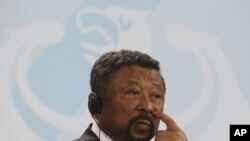Heads of state at this year's African Union summit in Addis Ababa will be voting to elect new leaders to the continental body. While the AU typically promotes regional diversity in its leadership, one observer group says it would be better to favor countries that have best adhered to AU protocols.
Each year, heads of African states select a new chairperson to head the African Union for a one-year term.
The new chair is usually selected on a rotating regional schedule, with leaders from north, south, east and west Africa getting a fair shot at the top seat.
But some observers say this process is unnecessarily arbitrary and that it would be better to choose candidates based on their country's merit.
Michael Orwa, projector coordinator for the State of the Union Coalition that monitors the AU, says few of the previous chairs have come from countries that had ratified AU agreements.
"Of the last five, from Equatorial Guinea, Libya, Malawi, Ghana, Tanzania for example, only Libya had done 26 ratifications of the 36 instruments that we were looking at. So, still maybe good by general standards and patterns in the continent, but I would say still not good enough," said Orwa. "What we want to see is how people in leadership will show by example in action as far as ratification and implementation at a country level is concerned.”
The African Union held a workshop in South Africa to outline to member nations the importance of quickly ratifying AU treaties and implementing the doctrines at home.
The AU said of the 42 treaties adopted since the formation of the Organization of African Unity (OAU) in 1963, only 25 have entered into force.
Critics have often accused the African Union of being too weak, and especially soft on human rights violations in member states. Defenders argue that the body does not have the capacity or manpower to be a more effective force.
Orwa of State of the Union says political will to change could make up for a lack of resources.
"And we acknowledge those limitations we acknowledge the limitations in capacity, we acknowledge limitations in resources even human, financial, but we believe at the same time a great political will is perhaps more important than even the most amazing amount of resources that we can have," he said.
In addition to the election of a new AU chair, African leaders will also select a new chairperson to the African Union Commission - the AU's main decision-making body.
Incumbent chairman Jean Ping of Gabon, running for a second four-year term, is facing a strong challenge from South African Home Affairs Minister Nkosazana Dlamini-Zuma.
The election is scheduled to take place Monday, and will be conducted electronically, with the results available immediately.
AU Observer Says Leadership Election a Chance for Change




